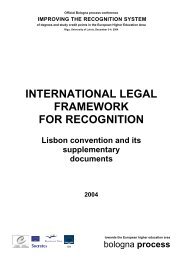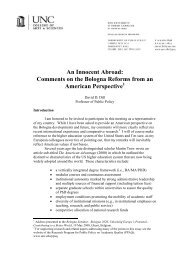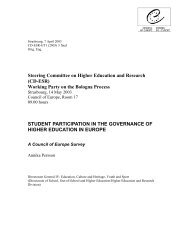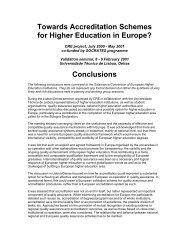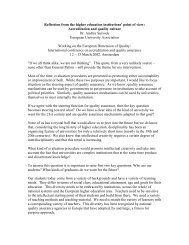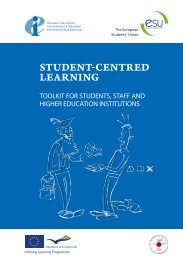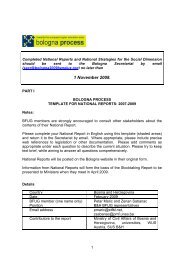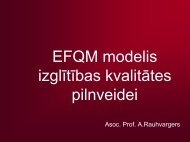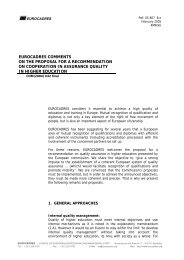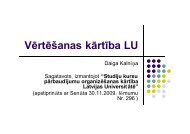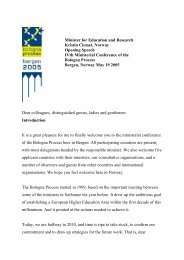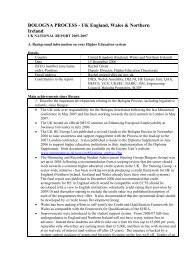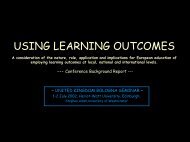9 EmployabilityBinary systems and the professional <strong>Master</strong>The issue of employability is particularly complex in countries with binary HE systems. Here, thedistinction is made – whether in law or in institutional mission only – between the ‘academic <strong>Master</strong>’and the ‘professional <strong>Master</strong>’. <strong>In</strong> some countries the gap is wide, as in Finland where access to the<strong>Master</strong> in UAS institutions requires three years of prior work experience, while in the universitiesBachelor to <strong>Master</strong> progression may be immediate. <strong>In</strong> the Netherlands, the distinction is maintainedbetween the <strong>Master</strong> – awarded by the practically oriented UASs – and the <strong>Master</strong> of Arts and <strong>Master</strong>of Science degrees conferred by the research-oriented universities. On the staffing side, GermanUASs will appoint to teaching posts only applicants who come with five years of professional orindustrial working life behind them; this is not the case with academic appointments in the classicaluniversities.<strong>In</strong> many countries, binary systems have become more flexible, or at least more congruent, asHogeschools and Fachhochschulen – reborn as UASs, in English, although not in the national language– aspire to higher levels of research and second cycle teaching programmes, and as universitiesintroduce more vocational courses in an attempt to raise the employment rates of their students.The separation may ultimately be dissolved by legislation, as happened in England in 1992, or it maybe retained with some tolerance of institutional drift, as is the case in Portugal.The softening of binarism raises the question of whether the term ‘professional <strong>Master</strong>’, whichthe Danish UAS sector at one time sought to make its own prerogative, continues to have any realcontent.The <strong>Europe</strong>an Network for Universities of Applied Sciences was set up in 2004 to represent nonuniversityHEIs in Austria, Denmark, Estonia, Finland, Germany, Ireland, Netherlands and Switzerland.Its current priority is the collaborative development of the Bachelor for the Labour Market (theBaLaMa Project), but it also speaks as a consortium of second cycle providers. Its statement to theLondon Bologna summit (signed by all participating countries except Germany) makes clear howit wishes the professional <strong>Master</strong> to be perceived: enjoying parity of esteem with the researchoriented<strong>Master</strong> and commutable with it in terms of access and progression. The ‘professional<strong>Master</strong>’ should have its place within an EHEA attuned to the Lisbon Agenda; in this context no HEIshould be excluded from engagement with applied research and innovation.The designation, however, is precise only in certain national circumstances. It cannot be generalised.At the <strong>Europe</strong>an level, it is best to regard it as a symptom of the stress evidenced in binaryenvironments, in which mission steer expresses the university aspirations of generic UASs, whilethe search for new markets drives universities to target cross-binary clientele. It is the product ofthe process of transition. <strong>In</strong> the EHEA, it will be difficult to find a <strong>Master</strong> that has no professionalapplication.It is therefore hard to predict a prosperous future for the ‘professional <strong>Master</strong>’ in the wider <strong>Europe</strong>anand international recruitment market. Certainly, there is nothing in <strong>Europe</strong> quite as targeted asthe American Professional Science <strong>Master</strong>’s. These two-year cross-disciplinary programmes werelaunched in 1997, aiming to equip Bachelor scientists and mathematicians with business and legalexpertise, allowing them to self-start in innovative enterprises or to take up middle-managementpositions in the corporate, governmental and NGO sectors. To <strong>Europe</strong>an eyes, these are a brand ofthe conversion <strong>Master</strong>, which in some <strong>Europe</strong>an countries has a long track record.58Many universities are also attempting to give the classical doctorate a higher employability value,thereby improving the career prospects of early stage researchers. This impacts on the ‘academic’research-focused <strong>Master</strong>, now under pressure to provide more flexible and competence-based accessroutes to the PhD. Hence the UK’s <strong>Master</strong> of Research [MRes], which delivers research methodologiesto doctoral students in a graduate school environment, thus mitigating the risk that research will
succumb to isolation and poor time management, while at the same time enhancing employability.<strong>In</strong> this sense, and in the context of the ERA, the research <strong>Master</strong> is no less a professional <strong>Master</strong> thanany other.The MBAFrom the point of view of the general public, the MBA is an excellent example of the professional<strong>Master</strong>. Originating in the US and, on arrival in <strong>Europe</strong>, the prerogative of specialist graduateschools, it is now well established in the broad spectrum of <strong>Europe</strong>an HE. Frequently of one yearin duration, with fewer on-course internships, the <strong>Europe</strong>an version typically caters for older, moreprofessionally experienced, students, than its North American equivalent.<strong>In</strong> its 2005 study of the likely impact of Bologna on graduate management education, GMACcalculated that Bologna would bring on stream around 12,000 ‘new’ graduate programmes. Itused three per university as its rule of thumb. These would cater intra-EHEA for something in theregion of a quarter of a million pre-experience business <strong>Master</strong> students and 30,000 MBA studentsannually.<strong>In</strong> this profusion there have been problems of definition. While welcoming Bologna’s expansionof the second cycle market, GMAC viewed with some alarm the ‘potentially confusing array ofnew <strong>Master</strong> degrees’. The water would remain muddy, in its view, until generalist and specialistpre-experience and post-experience qualifications were clearly distinguished in the nationalqualifications frameworks. It urged Bologna signatory countries to reserve the MBA title for postexperienceprogrammes. <strong>In</strong> Germany, where the distinction between the pre-experience <strong>Master</strong>of Arts (Business Administration) and the post-experience MBA is clear in law and manifest inaccreditation procedures, this is now the case.By 2007, according to the <strong>Europe</strong>an Foundation for Management Development [EFMD], thesituation was already being resolved. ‘A structured market for masters programmes in business andmanagement is taking shape in <strong>Europe</strong> around three clearly differentiated segments: the MBA,which will now benefit from official recognition as a national degree in most countries; the generalist<strong>Master</strong>s in Management; and the specialised MSc programmes’. This classification will take sometime to bed down – some students encountered by <strong>EUA</strong> feared that the <strong>Master</strong> would diminish theprestige of the MBA. NQFs will have the task of reassuring them.Enterprise educationThe Lisbon Agenda has stressed the relevance of particular thematic strands within the secondcycle. Business schools have taken on the corporate social responsibility agenda, while the <strong>Europe</strong>anCommission’s Directorate General for Consumer Affairs has funded a suite of transnational joint<strong>Master</strong> programmes in consumer education.Enterprise education is another such theme. DG Enterprise and <strong>In</strong>dustry has actively monitoredand fostered developments in secondary education, as well as in the first and second Bolognacycles. Its expert group on enterprise in non-business studies made detailed observationsand recommendations in 2008. These covered many of the issues already raised in this report:flexibility of course structures, curriculum development, work placement, employer involvement,the accreditation of RPL, intellectual property, innovation and incubation, HEI infrastructure. Thegroup called for the Commission to conduct ‘a regular and comprehensive benchmarking of publicpolicies in this area’ and to coordinate an action plan.Bologna is a propitious environment for enterprise education initiatives. They chime well with theshift to student-centred learning. <strong>In</strong> addressing such fields as social enterprise and the creative59



